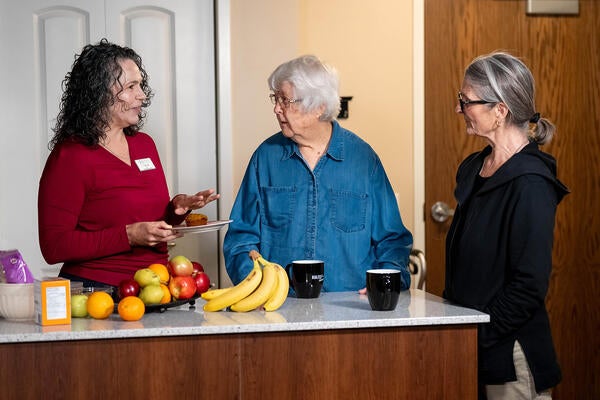
National Coming Out Day: Being out affects LGBT retirement plans
LGBT adults who are out to family and friends are less uncertain about their retirement years, Waterloo study finds

LGBT adults who are out to family and friends are less uncertain about their retirement years, Waterloo study finds
By Christine Bezruki Applied Health SciencesLesbian, Gay, Bisexual and Trans (LGBT) Canadians are less uncertain about their retirement years if they have openly discussed their LGBT identity with family and friends, according to a breakthrough study by the RBC Retirement Research Centre at Waterloo.
The 2015 LGBT Retirement Planning Study is the first survey in Canada to ask non-retired LGBT adults across Canada about the impact that disclosing or concealing their sexual orientation is having on their ability to prepare for living in retirement.

Photo credit: istock/daboost
“We’re increasingly seeing Canadian families led by LGBT adults and this has important implications for retirement planning,” said Professor Steven Mock, of the Faculty of Applied Health Sciences at Waterloo and director of the RBC Retirement Research Centre. “We wanted to explore if the added challenges LGBT adults can face – like feeling the need to ‘stay in the closet’ – might have an impact on retirement planning and how feeling well-supported socially might help.”
The LGBT study found that feeling supported and being out makes LGBT respondents less uncertain about their retirement prospects and more likely to have planning in place for later life and retirement. Among those who disclose their sexual orientation and feel supported, there is a higher likelihood to seek out retirement advice from friends, family and financial advisors. National Coming Out Day is on October 11.
“Having a partner who is engaged in retirement planning reduces one’s own uncertainty about retirement,” said Professor Mock. “Retirement planning isn’t just for heterosexual people.”
The LGBT Retirement Planning study is the first major collaborative project between Waterloo and RBC on retirement planning.
“There is a growing need for relevant information and innovative thinking to more fully support Canadians as they approach and enter their retirement years,” said Yasmin Musani, head of Retirement & Aging Strategies at RBC. “The research being conducted at Waterloo is helping ensure RBC is providing the best possible financial advice as Canadians of all backgrounds consider the lives they hope to lead in retirement.”
The Centre was created in 2010 by RBC and Waterloo to gain insights and expand expertise around retirement and well-being for Canadians in later life. The Centre is focused on developing innovative and practical, applicable information and ideas related to aging and health.

Read more
How machine learning empowers collaboration between computer science, math and medical research

Read more
Dr. Heather Keller discusses the need to transform mealtimes in Canada’s long-term care homes from a service to a meaningful form of care

Read more
“I’m just like you.”
The University of Waterloo acknowledges that much of our work takes place on the traditional territory of the Neutral, Anishinaabeg, and Haudenosaunee peoples. Our main campus is situated on the Haldimand Tract, the land granted to the Six Nations that includes six miles on each side of the Grand River. Our active work toward reconciliation takes place across our campuses through research, learning, teaching, and community building, and is co-ordinated within the Office of Indigenous Relations.